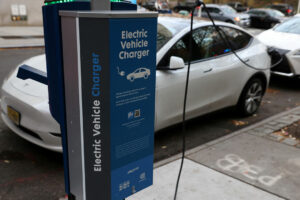PHL-S. Korea mineral deal seen stabilizing ore, EV supply chain
THE Board of Investments said a strategic cooperation agreement with South Korea is expected to ensure stable supply of critical minerals while generating potential investments. On the sidelines of the Philippines-Korea Business Forum on Monday, Trade Undersecretary and BoI Managing Head Ceferino S. Rodolfo said the memorandum of understanding (MoU) between the two countries will […]

THE Board of Investments said a strategic cooperation agreement with South Korea is expected to ensure stable supply of critical minerals while generating potential investments.
On the sidelines of the Philippines-Korea Business Forum on Monday, Trade Undersecretary and BoI Managing Head Ceferino S. Rodolfo said the memorandum of understanding (MoU) between the two countries will enable more mineral development.
“The participants will collaborate to discuss and form a strategic partnership for the establishment of critical raw material supply chains and cooperate to ensure a stable supply of critical raw materials,” Mr. Rodolfo told reporters.
He said that the MoU will enhance collaboration in the development, production, processing, and supply of critical materials.
He also expects enhanced research and development and cooperation in exploration, mining, processing, and recycling of critical minerals.
The critical minerals agreement is among the MoUs signed at Malacañang on Monday. The signatories were the BoI, the Department of Environment and Natural Resources (DENR), and South Korea’s Ministry of Trade, Industry, and Energy.
“The MoU is the first of its kind, jointly signed by (the BoI’s parent department, the Department of Trade and Industry) and the DENR, signifying a whole-of-government approach to responsible and sustainable development of the critical minerals sector,” the DTI said.
According to Mr. Rodolfo, South Korea is among the biggest importers of nickel, while the Philippines is the biggest exporter of nickel ore.
“The Philippines accounts for more than 25% of the total global supply of nickel ore exports. Next to us is New Caledonia with 17% and Russia with 11%,” he said.
“Now, more than 98% of our exports go to China, while 1% goes to Japan; South Korea accounts for less than 1%,” he added.
He said South Korea is the world’s third largest importer of nickel ore or concentrate, following China and Canada.
“However, the Philippines’ share of South Korea’s nickel ore or concentrate imports is less than 1%. And if you look at the share of the Philippines in South Korea’s total imports, it’s only 5%,” he said.
“This is small for a country that is the biggest supplier or exporter of nickel ore and concentrate, and for a country that is one of the biggest importers of something that the Philippines supplies,” he added.
Separately, Ferdinand Raquelsantos, chairman emeritus of the Electric Vehicle Association of the Philippines (EVAP), said that the impending free trade agreement (FTA) between South Korea and the Philippines will increase activity in the electric vehicle (EV) industry.
“We had several agreements in place, but once the FTA is out, there will be a tenfold increase,” he said.
“There’s going to be a lot more business interactions not only in automotive but also in agriculture,” he added.
He said EVAP has been pushing for the FTA to facilitate local assembly of EVs in the Philippines.
“We are hoping that South Korea will be the first to do that,” he said.
Two South Korean brands currently have a presence in the Philippines: Hyundai and Kia.
“They are at par, as far as sales is concerned, compared to (Chinese EV maker) BYD. But we are still looking forward for Kia to do local assembly here,” he said.
“Kia and Hyundai are selling very well here in the Philippines in both the internal combustion engine (ICE) and EV segments,” he added.
He said that the Philippines has a niche in manufacturing auto parts, including basic components needed for ICE and electric vehicles.
“We can supply the same things we supply ICE (manufacturers) to EV (manufacturers),” he said.
However, he said that the Philippines still has to expand EV adoption to attract manufacturing activity.
“There is a Taiwan company that has been talking to us for the last 14 years and is just waiting for the volume to go up,” he added. — Justine Irish D. Tabile























